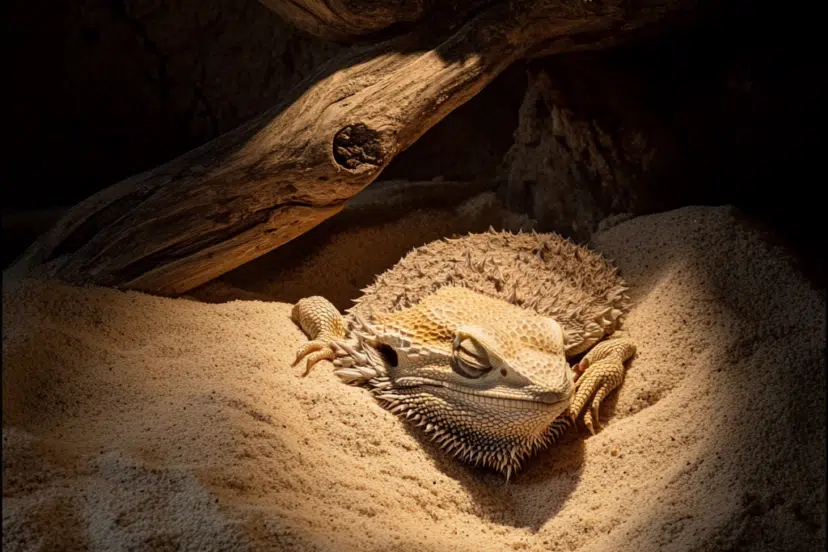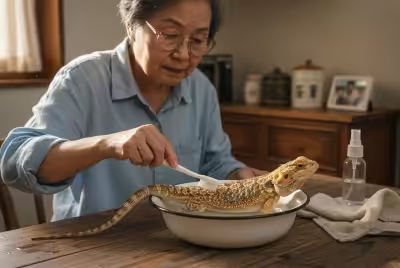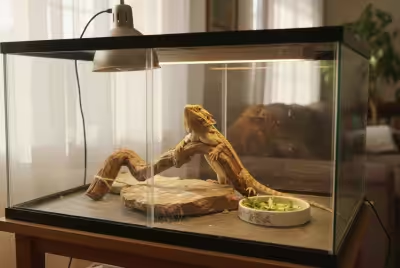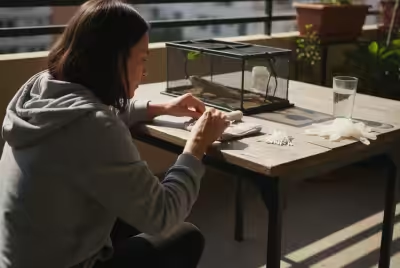Bearded Dragon Brumation: A Complete Guide
If you’re a bearded dragon owner, you’ve probably heard the term “brumation” before, and if not, you’ll want to be prepared for when your dragon decides to slow down and enter this phase. Brumation can be a confusing time, especially for new owners, but don’t worry—I’ve got you covered. In this guide, we’ll go over what brumation is, why it happens, and how to care for your dragon during this time. Let’s dive in!
What is Brumation?
Brumation is a natural process that occurs in reptiles, similar to hibernation in mammals. However, it’s not quite the same. During brumation, bearded dragons slow down, eat less, and may sleep for extended periods. It’s a period of dormancy, usually happening during the cooler months, when they conserve energy. While it may seem alarming at first, it’s a normal part of their biology.
Why Do Bearded Dragons Brumate?
Bearded dragons brumate as a survival mechanism. In the wild, they face cold seasons where food is scarce, and temperatures drop, making it hard for them to maintain their body temperature. Brumation helps them conserve energy until conditions improve.
The Evolutionary Purpose of Brumation
In their native habitats—typically the arid and semi-arid regions of Australia—bearded dragons experience seasonal changes that trigger brumation. With cooler temperatures and fewer resources available, brumation helps them survive by slowing their metabolism.
Differences Between Brumation and Hibernation
Brumation is often compared to hibernation, but it’s different. While mammals hibernate by completely shutting down their systems, reptiles like bearded dragons enter a lighter, more flexible dormancy. They may wake up periodically, drink water, or move around before going back to sleep.
Signs That Your Bearded Dragon is Going Into Brumation
So how can you tell if your dragon is about to brumate? There are a few key signs to watch for.
Changes in Behavior
The first sign that your bearded dragon is going into brumation is a noticeable decrease in activity. They’ll likely spend more time hiding, moving less, and even sleeping for long periods during the day. Don’t be alarmed if your dragon seems less interested in exploring their enclosure.
Physical Signs to Look For
Another tell-tale sign is a reduced appetite. During brumation, bearded dragons will often stop eating altogether, though they may still drink water. Their movements may slow down, and they might choose cooler areas of their enclosure to rest. These signs, combined, usually indicate that brumation is near.
How Long Does Brumation Last?
Brumation can last anywhere from a few weeks to several months, depending on the individual dragon and environmental conditions.
Typical Duration of Brumation
On average, brumation lasts around one to three months, but some dragons may brumate for a shorter or longer period. It’s not unusual for your dragon to stir occasionally and then return to their dormant state.
Factors That Influence Brumation Length
The duration of brumation can be influenced by factors such as age, health, and environmental conditions. Younger dragons may brumate for shorter periods, while older dragons can stay in brumation longer. Additionally, the ambient temperature in your home or their enclosure plays a significant role.
Should You Let Your Bearded Dragon Brumate?
One of the most common questions new owners ask is whether they should allow their bearded dragon to brumate. The short answer is: in most cases, yes, but it depends.
Weighing the Pros and Cons
Brumation is a natural process, and most healthy bearded dragons benefit from going through it. However, there are exceptions. If your dragon is sick or underweight, brumation could potentially worsen their condition. Always assess their health beforehand and consult a vet if you’re unsure.
Consulting With a Veterinarian
If your bearded dragon has never brumated before, or if you’re unsure about their health status, it’s a good idea to check in with a reptile-savvy veterinarian. They can give you guidance on whether it’s safe for your dragon to enter brumation and provide tips on how to monitor their health during this time.
How to Care for a Bearded Dragon During Brumation
Once your dragon has entered brumation, you’ll need to adjust their care routine to suit their lower energy needs.
Adjusting the Enclosure
Your bearded dragon will likely seek out cooler, darker spots to rest. It’s important to maintain a safe and comfortable environment. You don’t need to alter the basking area drastically, but ensure your dragon has access to a cooler part of the tank.
Managing Lighting and Temperature
You’ll want to reduce the amount of time the lights are on, mimicking shorter daylight hours. However, don’t turn off the UVB lighting completely. Keeping it on for a few hours a day will help support their metabolism and health.
Hydration and Feeding Tips
Even if your dragon isn’t eating, they may still drink water occasionally. Always ensure there’s fresh water available. You don’t need to force-feed during brumation—just let them wake up naturally and resume eating when they’re ready.
What to Do if Your Bearded Dragon Doesn’t Brumate
Not all bearded dragons will brumate, and that’s completely normal. Some dragons, especially those kept in consistently warm environments, may skip brumation altogether.
Understanding the Reasons
If your dragon doesn’t enter brumation, it could be due to environmental conditions, age, or even personality. Some dragons are more active year-round and simply don’t feel the need to brumate.
How to Keep Your Dragon Active
If your dragon skips brumation, keep them engaged with regular feedings, enrichment activities, and maintaining a consistent lighting schedule. Make sure they’re still receiving adequate UVB light and that their enclosure remains clean and stimulating.
Brumation in Captivity vs. in the Wild
Brumation in captivity can be quite different from what happens in the wild. While wild dragons rely on natural weather patterns to dictate their behavior, captive dragons experience artificial environments.
Natural Brumation in the Wild
In the wild, bearded dragons are exposed to seasonal changes that prompt them to enter brumation. This includes colder temperatures and shorter daylight hours, which signal that it’s time to conserve energy.
Differences in Captive Brumation
In captivity, brumation can be influenced by the temperature and light setup in your dragon’s enclosure. If they are exposed to consistent heat and light, they may brumate less frequently or for shorter periods. However, mimicking natural seasonal changes can encourage a more authentic brumation cycle.
Common Myths About Brumation
Several myths about brumation can confuse new owners. Let’s clear up a few of the most common ones.
Brumation Isn’t Dangerous
Many people worry that brumation is harmful or that their dragon might not wake up. In reality, brumation is a natural and safe process for healthy dragons, as long as you monitor their condition and provide proper care.
Every Bearded Dragon Will Brumate?
Not every bearded dragon will go into brumation, and that’s perfectly fine! Some may skip it entirely, while others might brumate one year and not the next. Brumation depends on factors like age, health, and environmental cues such as temperature and light. Just because your dragon doesn’t brumate doesn’t mean anything is wrong—it’s normal for some dragons to remain active year-round.
Conclusion: Understanding Your Bearded Dragon’s Needs
Brumation is a natural process for many bearded dragons, and as an owner, it’s essential to recognize the signs and adjust their care accordingly. Whether your dragon brumates or not, knowing how to respond to this behavior can help ensure they remain healthy and comfortable during this time. By adjusting the lighting, temperature, and hydration, and offering a peaceful environment, you’ll help your dragon navigate brumation with ease. Remember, every dragon is different, and as long as you stay attentive to their needs, your bearded dragon will thrive.
FAQs
- How do I know if my bearded dragon is brumating or sick?
Brumation involves reduced activity, appetite, and more sleep, but your dragon should still appear healthy. If they show signs of weight loss, discharge from the nose or mouth, or labored breathing, consult a vet to rule out illness. - Can I wake up my bearded dragon during brumation?
It’s best not to disturb your dragon during brumation unless necessary. Let them wake naturally. If you do need to check on them, be gentle and brief. - Do young bearded dragons brumate?
It’s less common for hatchlings and juveniles to enter full brumation, though they may show reduced activity. Most dragons begin to brumate as they mature, usually after their first year. - Should I stop feeding my bearded dragon during brumation?
Bearded dragons typically stop eating during brumation, so there’s no need to offer food. Ensure fresh water is always available, though they may drink less frequently. - Is brumation necessary for breeding?
Brumation is often considered a natural part of the breeding cycle, but not all dragons need to brumate for successful breeding. However, many breeders use brumation to signal dragons that it’s time to breed after they wake up.




